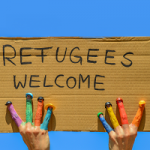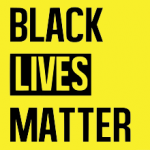By Ryan Clark

This past Sunday, our church sounded a call to begin another refugee ministry. We scheduled this service a month ago. I volunteered to be the preacher. The Scripture selected by the planners was Mathew 2:13-23, where Mary, Joseph and Jesus must flee Bethlehem for Egypt and Herod kills all the two-year-old children.
Here’s what I meant to say:
Have you ever wondered why Jesus didn’t grow up to be a terrorist?
Terrorists, after all, are altruists — believing they’re acting for the greater good. They are self-righteous and self-sacrificing. This can be triggered by traumatic events, geographic dislocation, isolation and from being abused, bullied and otherwise placed in positions of powerlessness. There is usually a lack of education, opportunity and then usually along comes some kind of authority, usually religious, that empowers them. There are other factors, too, such as absent parents whether physically or emotionally.
Setting aside the Son of God aspect, why doesn’t Jesus grow up to be a terrorist? We know Jesus experienced some formula of all the above. His parents, at least one time, left him in Jerusalem for goodness sake. It had to have been rough. Other kids he grows up with will become terrorists, or at least, Zealots. In fact, I’ve heard the disciple, Judas, called a terrorist by some scholars.
I taught a pastoral care to families’ class in the Philippines. We constructed genograms and talked about family systems theory for part of it. A genogram is a diagram of your family — like a family tree, using symbols in order to identify relationships an observe patterns. The basic idea is that we seek to identify unconscious patterns so that, by becoming aware, we gain the power to change our situation. Some easy patterns are elements like health — men dying at age 60 from heart disease.
My favorite is identifying family secrets, which of course, we all have. We start understanding why our family is the way it is.
We discover the reasons why, in our family, we’re not allowed to go swimming without an adult, or never allowed to own a motorcycle or wear a navy blue suit. These spoken and unspoken rules develop because something important happened in the past and the family learned a rule on that topic and passed it down to the next generation.
In white, middle class America, you don’t have work with too many people and sit with too many groups to identify the most common patterns and family secrets. Every family has secrets and these are very common. Now mother, if you’re watching on the internet, I’m talking in generalities about most families — not our family, of course!
You will not be surprised that when building genograms with students in Asia, I ran into a few new patterns.
For one, even a Genograms going back just two generations might still be 8 feet long with dozens of aunts and uncles. What was striking to me is that most students had large pieces of missing information, which represented in most cases family secrets. As our small covenant groups met and we went around and reported, there seemed to be many question marks over people’s names; many X’s in squares and circles representing death at young ages; and many, many missing people.
One Korean student’s family was missing the entire paternal grandparent’s side — grandfather and above. He and his kin were presumed alive somewhere north of the DMZ. There were Filipino overseas workers who left to provide a better life for their family and then never returned. In the Burmese genograms, there were uncles and aunts and brothers who were arrested and never heard from again. Nearly all the students had family members spread over multiple continents. One sibling is a nurse in the UK, another works in a chicken processing plant in Charlotte, N.C. While I was surprised, these stories from the students didn’t surprise their fellow students. They nodded knowingly at each other and were able to offer each other reams of empathetic understanding.
As a middle-class American, I cannot really imagine what several of my students and their families had gone through. Several of my colleagues at the Cooperative Baptist Fellowship do, however.
My friend Michelle, one of CBF’s field personnel, worked with Iraqi refugees in Atlanta before moving to Europe. She reminded me this week of the 20 steps and at least 2-year process in which those seeking refugee status with the U.S. must undergo. Reading the comments from her post was illuminating. She repeatedly had to correct false generalizations others were making. When challenged if she knew what she was talking about she stated:
“There are 65.3 million forcibly displaced people worldwide. 21.3 million are refugees. 40.8 million are internally displaced. 3.2 million are asylum seekers. What you saw last year was a humanitarian crisis and people fleeing for their lives from war. Matt [her husband] has been in a camp, as have I. We have colleagues that work at camps.”
She went on in a kind and direct way, genuinely trying to help others understand the global situation.
I’m on a couple different public and private prayer lists of field personnel and missionaries around the world. Many CBF field personnel and some Southern Baptists, American Baptists, British Baptists and independent missionaries send out stories that don’t make it into the magazines and blogs. The work Christians are doing in the name of Jesus is just as inspiring as the contexts are tragic.
As prayer requests, we praise God that portable heaters arrive in refugee camps in Turkey so babies will stop dying in the cold; that doctors are allowed back into camps so grandmothers will stop dying of diarrhea. It’s all just a drop in the bucket, immensely important drops from all over the theological spectrum. Come to think of it, no matter the denomination, progressive or conservative, I’m not aware of any of these ministries discriminating against refugees based on what religion they practice or what country they’re from.
One Southern Baptist missionary I went to college with posted Friday on his Facebook page, “Are we really praying for the nations on Sunday and then banning them on Monday?”
As of last night, it had received only 4 likes, including mine.
Of course, he’s referring to our government’s dramatic and anti-Christian shift in policy with regard to refugees — something I did not anticipate when agreeing to speak this Sunday, the Sunday where we sound a call to partner with International Rescue Committee to sponsor a refugee family as they resettle in the United States
I started this week wondering if I had anything to say and now I could spend the next two hours reading quotes from the Bible, Augustine, nearly every Protestant theologian, Billy Graham and the Pope. It’s too bad Franklin isn’t more like his father. But I don’t have to read the litany; we’ve all seen it on Facebook this week. Social media is giving American Christianity a well-deserved slap down.
I know this whole situation is difficult and extremely complicated. I know this — of course it is. And, interpreting Scripture is difficult. We seem to take some parts too seriously and others not enough. We avoid some passages and others we seem to obsess about. This one, to be perfectly honest, haunts me. As a good Baptist (or perhaps not-so-good Baptist) I read it and I try to imagine where I fit in the story. Am I Joseph, or Mary or Pharaoh, or Herod, an Angel, or Archelaus?
I know this is dangerous. Even so, then, I really can’t help myself; I start thinking about my society, are we living in Judea, or Egypt, or perhaps Galilee. This is even more dangerous. We can get into a lot of trouble making Biblical analogies to today. So, like a good Baptist, I’ll settle for a few principles.
Christians, we already know what these are, but for folks watching on the internet, I’ll review them:
Be kind and show hospitality to migrants! Some version of this appeal appears some 90 times in the Hebrew Bible.
Love your neighbor as yourself. I think Jesus said that one.
What we do to the least of these we do to Christ, says Jesus, again.
We are told in the New Testament that our hospitality to strangers might in fact be care for angels!
For Jesus and others of his time who did not become terrorists, I believe they found themselves in countries, in communities, in homes, where these principles were being taught and practiced. When fleeing terror they were greeted with Love. Of course, of course Jesus taught his disciples to love their neighbors! It was part of his religious tradition and what he experienced growing up!
We don’t have to repeat the mistaken cycles of violence of our past! We know what they are we have the power to change them.
As American Christians, we have all the resources to end terrorism once and for all. We have a theology and the right Christian ethic of loving our neighbors. We have enough financial resources to feed, clothe and house every refugee on the planet.
And if we had managed to do this — if we had — American Christians could live then next 1,000 years in God’s Shalom for doing what Jesus taught us to do. It would have been extremely hard, we would have had to face our fears and insecurities in ways we haven’t before, but we could have done it.
And, I suppose it’s not too late.
Ryan Clark is Church Engagement Manager at the Cooperative Baptist Fellowship. He leads at the intersection of the missions and the local church. He and his wife Cindy have two children, two dogs, three chickens and live in Decatur, Georgia.









